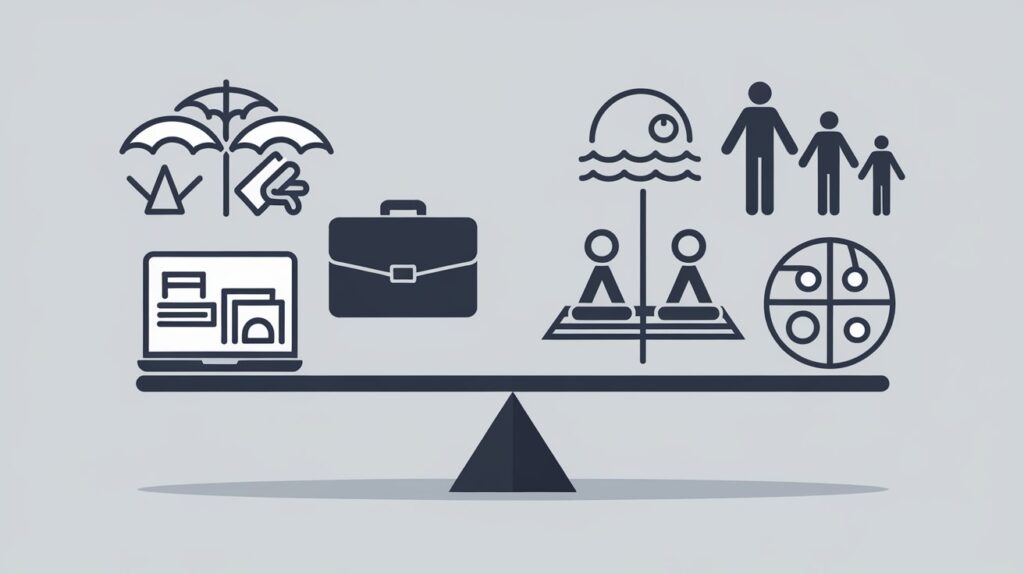Careers with work life balance are becoming essential in today’s professional landscape as more people prioritize jobs that align with personal well-being and professional growth. These careers offer a blend of flexibility, reduced stress, and opportunities for advancement, making them ideal for maintaining a healthy work schedule. Whether you’re looking for the best jobs for work-life balance, flexible career options, or low-stress professional careers, this guide explores industries and strategies that promote harmony between work and life. From remote opportunities to high-paying jobs with flexible schedules, we’ll uncover the ultimate paths to a balanced professional life in 2024.
Estimated Reading Time: 8–10 minutes
Table of Contents

Understanding Work Life Balance in Modern Careers
The concept of work life balance has gained immense importance in the modern professional landscape, especially as individuals strive to find harmony between personal obligations and career aspirations. In this section, we will explore the definition of work life balance, its significance in professional growth, and how current job market trends are shaping the availability of careers with work life balance.
Definition of Work Life Balance
Work life balance refers to the equilibrium where an individual can effectively manage both professional responsibilities and personal life without overwhelming stress or compromise. Unlike traditional rigid schedules, careers with work life balance often emphasize flexibility, allowing professionals to adjust their work hours or locations to meet personal needs. This flexibility can lead to greater job satisfaction and overall well-being, particularly in industries offering low-stress professional careers or jobs with a healthy work schedule.

Importance in Professional Growth
Having a career with work life balance is not just about personal well-being—it also significantly contributes to professional growth. Employees who maintain a healthy balance tend to experience higher productivity, better focus, and lower burnout rates. Flexible career options and roles that prioritize balance create an environment where individuals can thrive both professionally and personally. In particular, jobs with a healthy work schedule enable professionals to set boundaries, foster creativity, and achieve long-term career stability.
Current Job Market Trends
The job market has evolved to accommodate a growing demand for careers with work life balance. Remote work opportunities, hybrid roles, and industries prioritizing employee well-being are now more prevalent than ever. Careers in tech, healthcare, education, and creative industries are leading the way in offering flexible career options and jobs with a healthy work schedule. Employers are recognizing that providing balance is a key factor in retaining top talent and fostering loyalty.
As the world continues to adapt to new working models, low-stress professional careers and high-paying jobs with flexible schedules are becoming more accessible across various sectors. These trends reflect a broader shift towards prioritizing employee well-being in the workplace.
Top Careers with Exceptional Work Life Balance
Exploring Jobs that Prioritize Flexibility and Employee Well-Being
Finding a career with work life balance has become a top priority for many professionals. This section dives into careers that offer exceptional balance by focusing on remote and flexible job opportunities, industries that prioritize employee well-being, and emerging career paths that redefine traditional work structures.
Remote and Flexible Job Opportunities
Remote work has revolutionized how professionals approach their careers. Careers with work life balance often include roles that allow employees to work from home or choose flexible hours, fostering greater autonomy and reducing the stress associated with rigid schedules. Fields like software development, content creation, and customer support have seen a surge in remote opportunities, providing individuals the freedom to tailor their workdays.
Flexible career options also extend to part-time and contract roles in industries like marketing, writing, and graphic design. These jobs empower professionals to balance personal and professional responsibilities without sacrificing financial stability.

Industries Prioritizing Employee Well-being
Certain industries have made significant strides in promoting careers with work life balance. Healthcare, education, and technology sectors have introduced programs that ensure employees can maintain a healthy work schedule. For instance, companies offering compressed workweeks, generous leave policies, and wellness programs are leading the charge.
Moreover, low-stress professional careers in fields like project management, data analysis, and counseling are increasingly appealing to those seeking roles with manageable workloads and fulfilling responsibilities. Employers in these sectors emphasize mental health, creating a supportive work environment.
Emerging Career Paths
Emerging career paths, particularly those in sustainable development and digital entrepreneurship, are reshaping how professionals perceive work life balance. Roles in renewable energy, social media management, and e-commerce offer flexible schedules and opportunities for creative expression.
Digital nomad careers, where individuals work while traveling, have become popular among professionals seeking freedom and adventure. These roles blend professional growth with personal fulfillment, highlighting the increasing trend toward jobs with a healthy work schedule and flexibility.
Strategies for Achieving Work Life Balance
Practical Approaches to Balancing Career and Personal Life
Achieving a career with work life balance often requires proactive strategies. This section explores methods for identifying flexible careers, negotiating better work arrangements, and applying professional development techniques to maintain both productivity and personal fulfillment.
Identifying Flexible Careers
Finding careers with work life balance begins with identifying roles that inherently offer flexibility. Research industries and job descriptions for positions that emphasize remote work options, part-time schedules, or adaptable hours. Fields like freelancing, teaching, and tech-focused roles, such as software engineering, often provide flexible career options.
Networking can also play a critical role. Speaking with professionals already thriving in jobs with a healthy work schedule can provide insights into opportunities and trends in various industries.
Negotiating Work Arrangements
Once you’ve identified a promising role, negotiating work arrangements is key to aligning your career with your personal priorities. Discuss options like telecommuting, flexible hours, or compressed workweeks with your employer. Highlight how these adjustments can enhance your productivity and overall job satisfaction.
Many organizations are open to accommodating requests that promote employee well-being. Preparing a clear case that demonstrates how these changes benefit both parties can make your proposal more compelling.
Professional Development Techniques
Continuous learning is vital in maintaining a balanced career while staying competitive. Enrolling in online courses, attending workshops, and earning certifications can open doors to low-stress professional careers with better growth opportunities.
Time management and productivity tools are also invaluable for professionals aiming to strike a balance. Techniques such as prioritizing tasks, setting boundaries, and utilizing apps for schedule management can help you excel without becoming overwhelmed.
High-Paying Jobs with Flexible Schedules

Combining Financial Success with Work Life Balance
A career with work life balance doesn’t have to mean sacrificing a competitive salary. Many high-paying jobs now offer flexible schedules, enabling professionals to achieve both financial success and personal well-being. Let’s explore salary expectations, career progression opportunities, and industry-specific roles that cater to flexibility.
Salary Expectations
High-paying careers with work life balance often include roles in tech, healthcare, consulting, and remote-friendly industries. These positions offer salaries ranging from $70,000 to well over $150,000 annually, depending on expertise and experience. Examples include software developers, data analysts, and management consultants who often have the freedom to work remotely or set their schedules.
Flexibility doesn’t equate to lower income; instead, it allows employees to manage their time efficiently while still reaping financial rewards.
Career Progression
Flexible roles are no longer limited to entry-level or freelance work. Many industries now recognize the importance of offering work-life balance at higher career stages, providing opportunities for advancement without compromising personal time.
For instance, professionals in remote-friendly roles like project management or UX design can climb the career ladder while maintaining adaptable work arrangements. Growth paths in these fields may lead to senior management positions or specialized consulting roles with even greater earning potential.
Industry-Specific Opportunities
Certain industries stand out for offering high-paying jobs with flexible schedules:
- Technology: Positions such as cloud architects, cybersecurity specialists, and software engineers provide lucrative salaries and options for remote work or flexible hours.
- Healthcare: Specialized roles like telemedicine physicians and freelance medical writers offer substantial incomes with adaptable schedules.
- Education and Training: Online educators, curriculum developers, and e-learning specialists combine the stability of high pay with scheduling flexibility.
- Creative Fields: Freelance writers, digital marketers, and graphic designers often enjoy project-based work, allowing for time autonomy.
These fields demonstrate how careers with a healthy work schedule are becoming a standard across industries, particularly as companies prioritize employee satisfaction.
Technology and Work-Life Balance Careers
Leveraging Tech for a Balanced Professional Life
In an increasingly digital world, technology has redefined the concept of a career with work life balance. From remote work opportunities to the rise of digital nomads, tech careers are leading the way in providing flexible, fulfilling, and innovative professional paths.
Remote Work Options
Technology-driven industries have embraced remote work more than any other sector. Careers in software development, digital marketing, IT support, and cloud computing are prime examples of roles that offer the freedom to work from anywhere.
Companies like Google, Microsoft, and smaller startups prioritize flexible arrangements, enabling employees to maintain a healthy work schedule while meeting their professional goals. For introverts or those who thrive in quieter settings, these jobs also provide a personalized work environment, making them ideal for maintaining balance.
Digital Nomad Possibilities
The concept of the digital nomad lifestyle has gained traction in recent years, allowing professionals to combine work with travel. Tech-related roles such as web developers, SEO specialists, and online consultants are particularly suited for this lifestyle.
Digital nomads can work from co-working spaces, coffee shops, or even beachside cafes, provided they have internet connectivity. This flexibility embodies the ultimate work-life balance, blending professional fulfillment with personal freedom.
Tech-Enabled Flexibility
Advancements in technology have facilitated the growth of careers with healthy work schedules. Tools like project management software, cloud-based platforms, and virtual collaboration applications allow professionals to work efficiently without being confined to a traditional office setup.
Some tech-enabled roles that highlight flexibility include:
- App Developers: Creating apps for diverse industries, often with the option to freelance or work remotely.
- Data Scientists: Analyzing complex datasets from virtually anywhere.
- Cybersecurity Experts: Monitoring systems remotely while ensuring robust security measures.
Tech careers prove that balancing work and life is not just possible but is quickly becoming the norm.
Maintaining Professional Growth
Strategies to Thrive in a Balanced Career
Balancing professional growth with a career that offers work life balance is essential for long-term success and personal satisfaction. This involves continuously enhancing skills, strategizing for career advancement, and embracing lifelong learning to stay competitive in today’s dynamic job market.
Skill Development
Even in careers with healthy work schedules, staying relevant requires proactive skill enhancement. Professionals should regularly evaluate their skills and identify gaps to remain adaptable to industry changes.
- Upskilling in Technology: Digital tools and platforms evolve rapidly. For example, mastering project management software or advanced analytics tools can help employees excel in their roles.
- Soft Skills Focus: Careers with flexible schedules often require exceptional communication and time management skills. Developing these traits can lead to improved efficiency and collaboration.
- Certifications and Online Courses: Platforms like Coursera, LinkedIn Learning, and Skillshare offer certifications in areas like leadership, marketing, and specialized tech skills.
Career Advancement Strategies
Growth opportunities can sometimes seem limited in roles that emphasize work life balance. However, adopting smart strategies can ensure upward mobility:
- Set Clear Goals: Define short- and long-term career objectives. Whether it’s a promotion, salary increase, or lateral move to a more fulfilling role, clarity in goals is vital.
- Seek Mentorship: Connect with industry leaders or experienced colleagues who can provide guidance and insights for advancement.
- Network Actively: Join professional groups and attend industry-specific events to build meaningful connections that could lead to new opportunities.
Continuous Learning
In careers with work life balance, continuous learning is a cornerstone of success. Industries evolve, and staying informed is key to maintaining relevance:
- Stay Updated: Regularly read industry reports, blogs, and news to understand emerging trends and technologies.
- Pursue Advanced Education: Enroll in advanced degrees or specialized programs that align with long-term goals.
- Experiment with New Roles: Embrace lateral moves within an organization to acquire diverse experiences and broaden your skill set.
Maintaining professional growth while balancing life requires dedication, but it’s achievable with the right mindset and tools.
Success Guide for Balanced Professional Life

Strategies to Achieve Career Fulfillment and Harmony
A career with work life balance goes beyond managing hours; it’s about ensuring mental health, fostering personal growth, and planning for a fulfilling professional journey. This guide provides actionable steps to create a career that aligns with both personal and professional aspirations.
Mental Health in Career Choices
Your career should support—not hinder—your mental well-being. Considering mental health as a factor when selecting or maintaining a job is essential for long-term satisfaction.
- Avoid Burnout: Jobs with healthy work schedules prioritize manageable workloads and respect for personal time. Look for roles with clear boundaries to protect mental health.
- Workplace Support Systems: Seek out employers that offer wellness programs, mental health resources, and an open culture regarding mental well-being.
- Stress Management Techniques: Even in careers with flexible schedules, stress can arise. Practices like mindfulness, meditation, or regular physical activity can help maintain balance.
Personal Development
A balanced life includes continuous self-improvement, both professionally and personally. Personal development is key to ensuring that work life harmony doesn’t come at the cost of growth.
- Set Personal Goals: Outline objectives for physical health, hobbies, and relationships alongside career ambitions.
- Explore New Interests: Take advantage of flexible career options to pursue hobbies, volunteer work, or creative endeavors.
- Invest in Self-Care: Prioritize activities that recharge you, such as reading, traveling, or simply relaxing.
Long-Term Career Planning
A sustainable career path combines immediate needs for balance with long-term aspirations. Proper planning ensures a trajectory that satisfies both goals.
- Create a Vision: Envision where you want to be in 5, 10, or 20 years. Does your current career path align with that vision?
- Evaluate Periodically: Regularly assess your career for alignment with your values, work life balance needs, and personal goals.
- Consider Retirement Plans: A balanced career should include financial planning for the future. Invest in savings and retirement funds to secure long-term stability.
By aligning your career with your mental health needs, personal aspirations, and long-term goals, you can build a professional life that’s both rewarding and sustainable.
Conclusion
Finding careers with work life balance is no longer a luxury but a necessity in today’s fast-paced world. Whether you’re exploring flexible career options, seeking low-stress professional careers, or pursuing high-paying jobs with a healthy work schedule, there’s an ideal path for everyone.
Achieving balance requires a combination of self-awareness, strategic planning, and adaptability. By choosing careers that align with your personal and professional goals, investing in personal development, and prioritizing mental well-being, you can build a fulfilling and sustainable professional life.
Work life balance is not just about managing time; it’s about creating a life that allows you to grow, thrive, and find joy in both your career and personal endeavors. Start your journey today and redefine success on your terms.
References
- Work-Life Balance Trends
Forbes – 2024 Workplace Trends - Remote Work and Flexibility
Remote.co – Flexible Job Opportunities - Mental Health in the Workplace
American Psychological Association – Work-Life Balance - Career Development Strategies
Indeed – Professional Growth Tips




